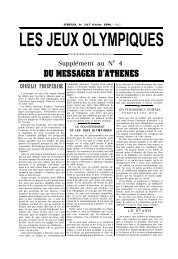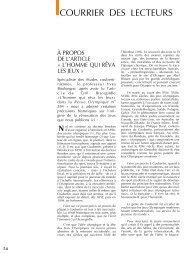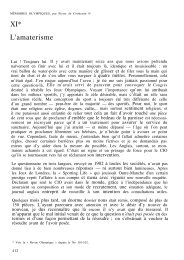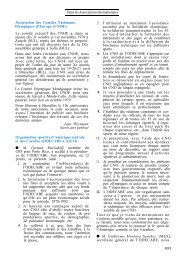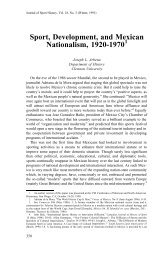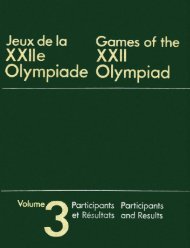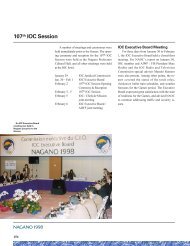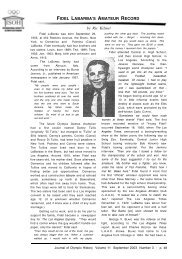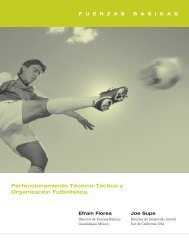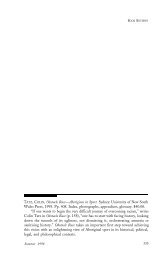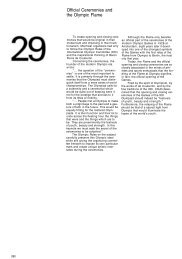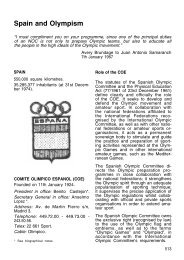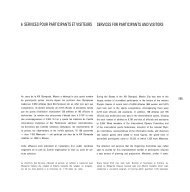Part 2 - LA84 Foundation
Part 2 - LA84 Foundation
Part 2 - LA84 Foundation
You also want an ePaper? Increase the reach of your titles
YUMPU automatically turns print PDFs into web optimized ePapers that Google loves.
16. Reception and Protocol<br />
Category<br />
IOC<br />
IF<br />
NOC<br />
GV<br />
G<br />
Total<br />
490<br />
Organization<br />
IOC<br />
IF<br />
NOC<br />
Foreign<br />
Domestic<br />
Foreign<br />
Domestic<br />
12<br />
Persons Entitled<br />
Invitees in "G" category were provided<br />
with shuttle bus services, while lodging<br />
quarters, to be paid for, were the<br />
apartments built for the Games. Commemorative<br />
articles were "C" class,<br />
and free admission to the Opening<br />
and Closing Ceremonies was limited<br />
to foreign VIPs.<br />
To efficiently carry out protocol services<br />
for the VIPs, the SLOOC operated<br />
a protocol computer room in the Protocol<br />
Situation Room; the computer<br />
room was equipped with three CRTs,<br />
and three M-printers.<br />
The protocol computerization covered<br />
the management of personal status of<br />
the VIPs, protocol planning, schedules<br />
management, supply of information<br />
related to VIPs, management of<br />
hosts/hostesses, and management of<br />
invitations. The computer room made<br />
a significant contribution to the protocol<br />
services performance by computerizing<br />
matters relating to the<br />
selection of those eligible for protocol<br />
services for the Opening and Closing<br />
Ceremonies, processing of RSVPs,<br />
issuance of invitation cards and information,<br />
seating arrangement, personal<br />
background checks, and security slips.<br />
President, members, honorary members, secretary general,<br />
sports director, solidarity director, and their<br />
one each companion<br />
Presidents and secretaries general of Olympic sports<br />
Presidents, secretaries general<br />
16.2.2<br />
VIPs Host/Hostess Services<br />
—————————————–<br />
Selection of hosts and hostesses<br />
To provide suitable hosts and hostesses<br />
with appropriate language skills for the<br />
VIPs coming to Korea for the Games,<br />
the SLOOC selected and operated the<br />
hosts and hostesses in accordance<br />
with IOC provisions and with due consideration<br />
of experiences at the Asian<br />
Games and other international sports<br />
events.<br />
The host/hostess operation was done<br />
under the following guidelines:<br />
1) Language services were offered<br />
chiefly in eight languages, including<br />
IOC official languages (English and<br />
French), working languages (Spanish,<br />
German and Russian), and others<br />
(Japanese, Chinese and Arabic), 2)<br />
enhancement of performance through<br />
Persons Eligible for Protocol Services & State of Their Arrivals<br />
Heads of state, Royal families, minister-level dignitaries,<br />
special guests invited by IOC, foreign mission chiefs in Korea,<br />
large sponsors, representatives of television rights holders<br />
Minister-level and higher officials, organizing committee members,<br />
contributors of cash donation totalling more than 1.5 billion won,<br />
persons who contributed to sports development,<br />
Olympic hosting and national development<br />
IOC-invited guests, senior officials of support companies and<br />
television rights holders, vice-minister-level and higher<br />
officials, persons who contributed to Korea's winning of the<br />
right to host the Olympics and to the staging of the Games<br />
Vice-minister-level and higher officials, national assembly<br />
members, representatives of sponsor companies, persons who<br />
contributed to sports development, to Korea's winning of the<br />
Games and to national development<br />
case-by-case training. 3) selection and<br />
deployment of competent persons with<br />
good manners and personality 4) subdivision<br />
of the organization of<br />
hosts/hostesses is with team leaders<br />
controlling team members by category<br />
and reporting and checking operational<br />
status. People conversant with Korean<br />
culture and sports were considered as<br />
hosts/hostesses. They also needed to<br />
be pleasant in appearance and possess<br />
foreign language proficiency of above<br />
the fifth-grade level.<br />
In September 1987, 62 persons were<br />
designated as hosts and hostesses.<br />
Forty more were designated in<br />
November, and an additional 91 in<br />
January 1988. In April 1988, 79<br />
persons from among government<br />
officials and juridical corporates were<br />
selected. In May, 48 were picked from<br />
among freshmen in Ewha Woman's<br />
University.<br />
Education and placement<br />
Because the hosts/hostesses were<br />
exposed to the foremost area of protocol<br />
services by personally accompanying<br />
VIPs during the Games<br />
period, the training for them focused<br />
on traditional Korean culture, and the<br />
appreciation of national identity.<br />
On May 28, 1988, SLOOC conducted<br />
training for 208 personnel with respect<br />
to protocol in general, operation of the<br />
Headquarters Hotel, guiding for safety<br />
and spiritual education. From July 4 to<br />
6,340 personnel received education at<br />
Namhangang Training Institute with<br />
respect to such job education as<br />
airport reception transportation and<br />
body guard services, panel discussion<br />
and protocol in general. From August<br />
3 to 7, field adaptation training was<br />
done at Seoul Sports Complex venues<br />
in the Olympic Park, airports, IBC and<br />
Headquarters Hotel; training on<br />
transportation services between<br />
airports and the Headquarters Hotel,<br />
and between each venue of<br />
competition and the Headquarters<br />
Hotel was conducted, along with<br />
adaptation training. During the Games<br />
period, selected teachers from<br />
Number of Persons Entitled<br />
220<br />
104<br />
590<br />
285<br />
307<br />
482<br />
745<br />
2,733<br />
Number of Arrivals<br />
197<br />
114<br />
460<br />
285<br />
307<br />
482<br />
745<br />
2,590<br />
schools at every level were appointed<br />
as host/hostees team directories of<br />
major organizations, various guide<br />
pamphlets for functions, and public<br />
relations booklets published by<br />
domestic related organizations for<br />
tour, traffic, accommodation,<br />
shopping and restaurants,<br />
leaders to oversee some 400<br />
personnel in respect to their daily<br />
reporting for duty, compilation of host<br />
services log, and scheduling of<br />
services.<br />
Host/hostess guide officers were<br />
responsible for resolving troubles the<br />
hosts and hostesses encountered in<br />
their daily activities.<br />
16.2.3<br />
Guide Desks and Orientation<br />
Centers<br />
—————————————–<br />
The SLOOC established and operated<br />
guide desks and Orientation Centers<br />
to efficiently carry out protocol<br />
services.<br />
The guide desks were set up on the<br />
firs-floor lobby at eight designated<br />
hotels including Hotel Shilla which was<br />
the Headquarters Hotel, Hotel Lotte,<br />
Walker Hill, Hilton, Plaza, Intercontinental,<br />
Westin Chosun, Hyatt, and<br />
Ambassador.<br />
In the Headquarters Hotel, the desk<br />
was operated for 35 days from September<br />
1, 1988 to October 5. Desks at<br />
the designated hotels were in operation<br />
for 31 days from September 5 to<br />
October 5.<br />
The guide desks were responsible for<br />
all kinds of protocol services including<br />
guidance to Games-related matters,<br />
guide to major official functions, guide<br />
to sightseeing, traffic, accommodation,<br />
shopping, cultural functions. The desk<br />
also took charge of general inquiries,<br />
comings and goings of VIPs, recovery<br />
of lost items, and guide assistance for<br />
spouses of VIPs. To perform these<br />
tasks, the guide desks were provided<br />
with games schedules, schedules for<br />
banquets and international conferences,<br />
shuttle bus operation schedules,<br />
tables of standard protocol services<br />
for Olympic Family, telephone<br />
Au the guide desks, Korean interpreter<br />
-guides worked alongside foreign<br />
interprete-guides. Female guides were<br />
dressed in traditional Korean costume.<br />
The human resource input into the<br />
guide desks totalled 42 including 21<br />
interprete-guiders for English, 18 for<br />
French, and three for Spanish.<br />
The Orientation Centers were established<br />
on the first-floor lounge of the<br />
Headquarters Hotel and next to the<br />
Accreditation Centers supplemented<br />
the functions of the guide desks by<br />
providing information and all guide<br />
services.<br />
The Orientation Center also distributed<br />
gifts and invitation cards. The<br />
information materials made available<br />
at the Orientation Center included<br />
leaders to oversee some 400 personnel<br />
in respect to their daily reporting<br />
for duty, compilation of host services<br />
log, and scheduling of services.



